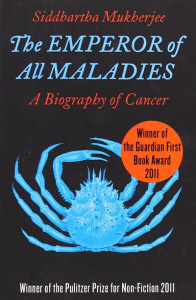The Emperor of All Maladies
 By Siddhartha Murkherjee
By Siddhartha Murkherjee
Review by Thomas (Medical Sciences)
The Emperor of All Maladies written by Siddhartha Murkherjee recounts the history of the research and treatments of cancer and its development over time. It goes all the way from some of the first known cases of cancer where knowledge of the disease was extremely limited right up to the present day. It follows the advances in oncology and goes on to describe how those advances went on to influence treatment methods and drug design. Both successful and failed hypotheses and experiments are discussed and it really gives a full picture of the struggle to get to the point we are currently at in the battle with cancer.
The book also goes into some detail on the politics that were in play in the history of cancer. This includes the government’s role in encouraging research in the field of oncology and also managing public perception of the disease and the fight against tobacco advertising.
I found this book to be extremely well written and easy to read, with the ability to engage readers regardless of prior knowledge on the topic. It starts with the basics of different topics and gradually builds up the complexity to be able to discuss more difficult points while at the pace which the reader is able to follow.
The boom goes over the cellular and molecular biology of cancer cells in a very clear way and also describes medical practices and surgical methods of treating the disease. I would highly recommend reading this book as it gives you a great understanding of a disease which is very relevant today and it gives an insight into how the medical and scientific fields have developed over time.
Review by Roshan (Medicine)
In Year 12, when I was looking for books to read about medicine, I was recommended loads of ones about life as a doctor: Atul Gawande’s Better: Diary of a Junior Doctor, This is Going to Hurt – the classics. These were a great insight into the career (if a tad depressing at times), but I really wanted a book that explored the science of medicine in a way that was just as interesting. That’s when I found The Emperor of All Maladies.
This book brands itself as a biography of cancer, but to me it tells the story of humanity’s fight against the disease, and the generations of doctors, researchers and policy workers who have dedicated their lives to stopping it. From the first written description of breast cancer in an ancient Egyptian papyrus, to modern innovations such as immunotherapy (genetically programming the immune system against cancer), and creating monoclonal antibodies to target specific proteins found only on cancer cells, this book takes you on a journey through medical history and really makes you appreciate how far we have come.
One of the things I love about this book is how it captures the breadth of medicine as a field. It doesn’t just tell you about the day to day work of oncologists, but explores the lives of doctors who went above and beyond their job description. I’m glad I’ve learned about Sidney Farber, who pioneered the first nationwide cancer fundraising campaign and worked as a public cancer research advocate as well as discovering chemotherapy, and about Doll and Hill, who first proved the link between smoking and lung cancer, creating the field of epidemiology (studying populations to learn about disease). The people covered in the book are really inspirational, and honestly make me proud to study medicine.
The book is not all science – Mukherjee also considers the perspective of a cancer patient by interposing chapters about one of his own patients, Carla, and her struggle against leukaemia throughout, and these are some of the most emotional and compelling parts of the book. We feel the highs and lows of a cancer patient’s experience, and how the disease and their treatment can affect their lives.
From an academic point of view though, this is a brilliant introduction to medical science, diagnosis, and treatment, and it feels like you are reading a story, not a textbook. Cancer is a disease that can affect almost any part of the body, and so you pick up a lot of amazing knowledge about how the body works from the book. By providing such a great overview, it gives you a jumping-off point to learn more about the things that interest you in medicine. For example, I based my Extended Project Qualification in Year 13 on research I learnt about in this book (personalised medicine and its use in oncology). If you are at all interested in medicine (its science, its history, or careers in medicine), you’ll find something you’ll love in this book – I cannot recommend it enough.
The Emperor of All Maladies by Siddhartha Murkherjee
ISBN-10: 1439170916
ISBN-13: 978-0007250929
Try checking the availability of this book at your school or local library or explore second hand bookshops and websites. You may also wish to purchase from either Amazon or Blackwell’s.
